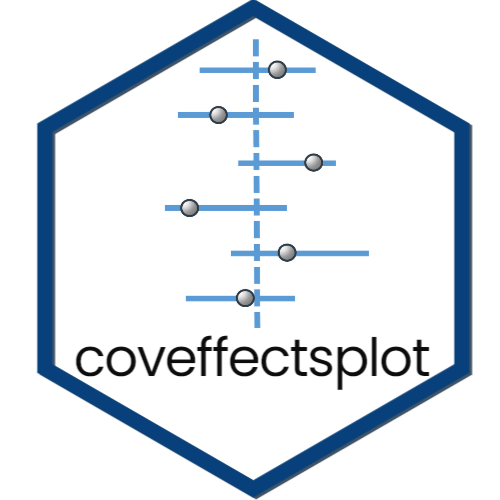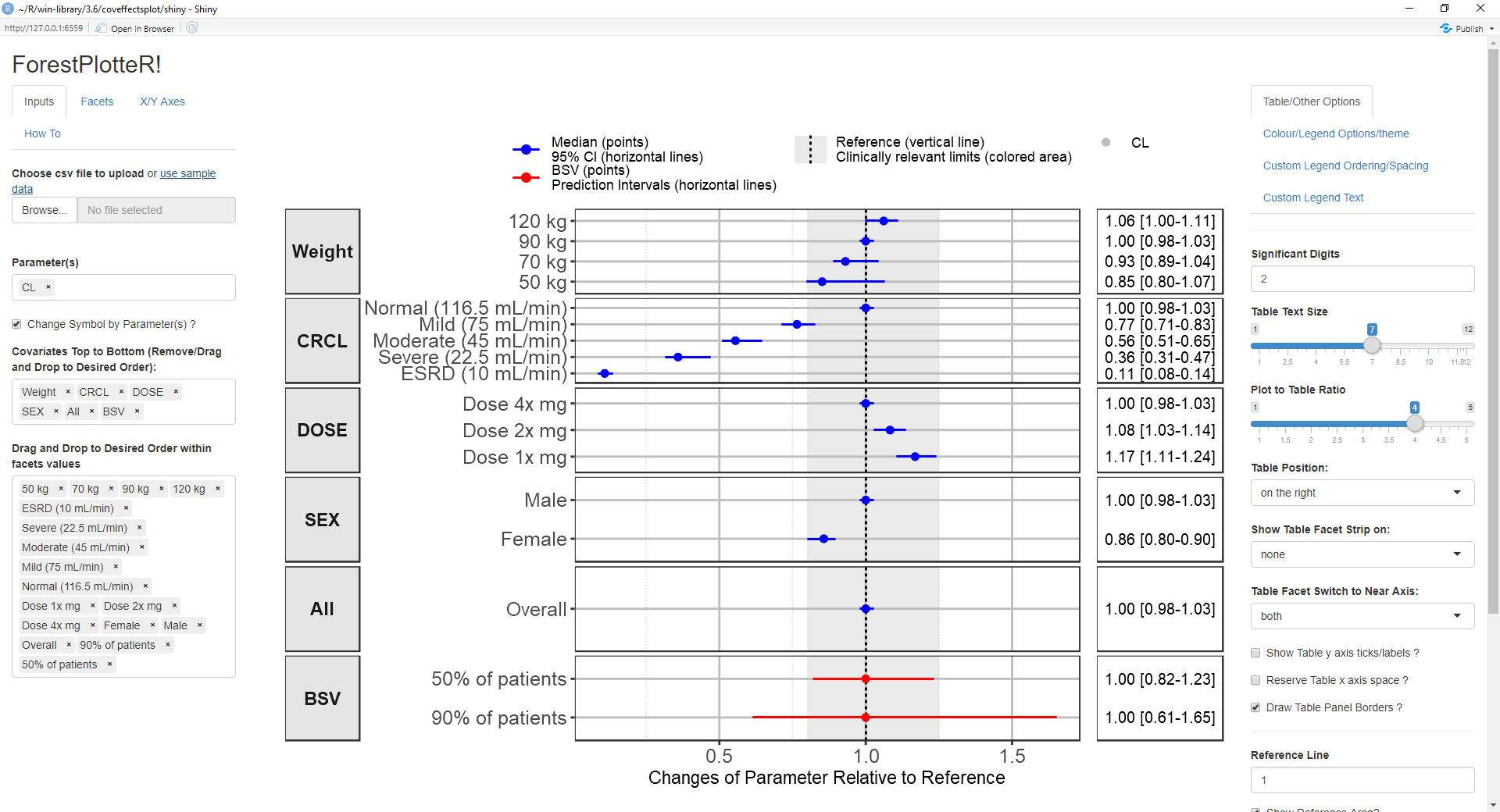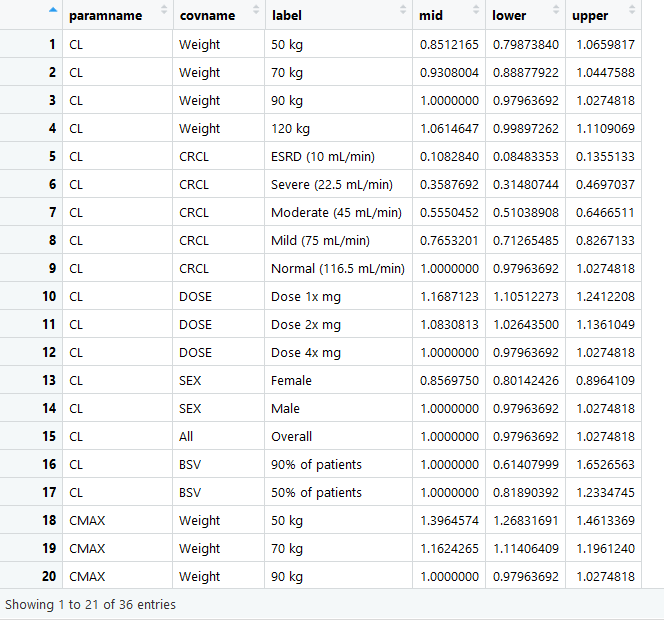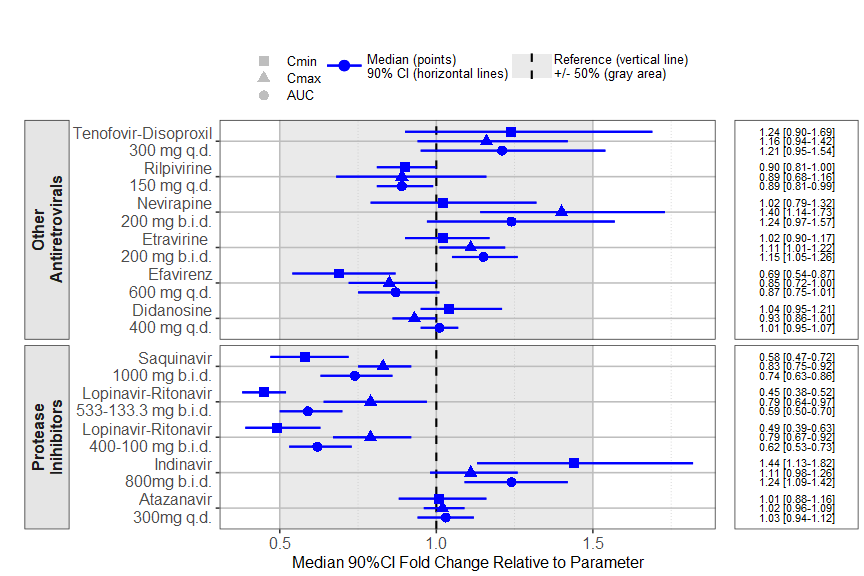
The hardware and bandwidth for this mirror is donated by dogado GmbH, the Webhosting and Full Service-Cloud Provider. Check out our Wordpress Tutorial.
If you wish to report a bug, or if you are interested in having us mirror your free-software or open-source project, please feel free to contact us at mirror[@]dogado.de.

A package that provides the function forest_plotand an
accompanying Shiny App that facilitates the production of forest plots
to visualize covariate effects as commonly used in pharmacometrics
population PK/PD reports.
# Install from CRAN:
install.packages("coveffectsplot")
# Or the development version from GitHub:
#install.packages("devtools")
devtools::install_github('smouksassi/coveffectsplot')Launch the app using this command then press the use sample data blue text to load the app with a demo data:
coveffectsplot::run_interactiveforestplot()This will generate this plot: 
Several example data are provided to illustrate the various
functionality but the goal is that you simulate, compute and bring your
own data. The app will help you, using point and click interactions, to
design a plot that communicates your model covariate effects. The data
that is loaded to the app should have at a minimum the following columns
with the exact names: * paramname: Parameter on which the effects are
shown e.g. CL, Cmax, AUC etc.
* covname: Covariate name that the effects belong to e.g. Weight, SEX,
Dose etc.
* label: Covariate value that the effects of which is shown e.g. 50 kg,
50 kg\90 kg (here the reference value is contained in the label).
* mid: Middle value for the effects usually the median from the
uncertainty distribution.
* lower: Lower value for the effects usually the 2.5% or 5% from the
uncertainty distribution.
* upper: Upper value for the effects usually the 97.5% or 95% from the
uncertainty distribution.
You might also choose to have a covname with value All (or other appropriate value) to illustrate and show the uncertainty on the reference value in a separate facet.
Additionally, you might want to have a covname with value BSV to illustrate and show the the between subject variability (BSV) spread.
The example data show where does 90 and 50% of the patients will be based on the model BSV estimate for the selected paramname(s).

The vignette Introduction
to coveffectsplot will walk you through the background and how to
compute and build the required data that the shiny app or the function
forest_plotexpects. There is some data management steps
that the app does automatically. Choosing to call the function will
require you to build the table LABEL and to control the ordering of the
variables. The forest_plot help has several examples.
The package also include vignettes with several step-by-step detailed
examples:
PK
example
Pediatric
example
PK
PD example
Exposure
Response
The prezista drug label data was extracted from the FDA label and
calling the forest_plot function gives:
library(coveffectsplot)
plotdata <- dplyr::mutate(prezista,
LABEL = paste0(format(round(mid,2), nsmall = 2),
" [", format(round(lower,2), nsmall = 2), "-",
format(round(upper,2), nsmall = 2), "]"))
plotdata<- as.data.frame(plotdata)
plotdata<- plotdata[,c("paramname","covname","label","mid","lower","upper","LABEL")]
plotdata$covname <- factor(plotdata$covname)
levels(plotdata$covname) <- c ("Other\nAntiretrovirals","Protease\nInihibitors")
#png("prezista.png",width =12 ,height = 8,units = "in",res=72,type="cairo-png")
coveffectsplot::forest_plot(plotdata,
ref_area = c(0.5, 1.5),
base_size = 16 ,
x_facet_text_size = 13,
y_facet_text_size = 16,
y_facet_text_angle = 270,
interval_legend_text = "Median (points)\n90% CI (horizontal lines)",
ref_legend_text = "Reference (vertical line)\n+/- 50% (gray area)",
area_legend_text = "Reference (vertical line)\n+/- 50% (gray area)",
xlabel = "Median 90%CI Fold Change Relative to Parameter",
facet_formula = "covname~.",
facet_switch = "both",
facet_scales = "free",
facet_space = "free",
strip_placement = "outside",
paramname_shape = TRUE,
table_position = "right",
table_text_size = 4,
plot_table_ratio = 4,
vertical_dodge_height = 0.8,
legend_space_x_mult = 0.1,
legend_order = c("shape","pointinterval","ref", "area"),
legend_shape_reverse = TRUE,
show_table_facet_strip = "none",
return_list = FALSE)
#dev.off()
These binaries (installable software) and packages are in development.
They may not be fully stable and should be used with caution. We make no claims about them.
Health stats visible at Monitor.